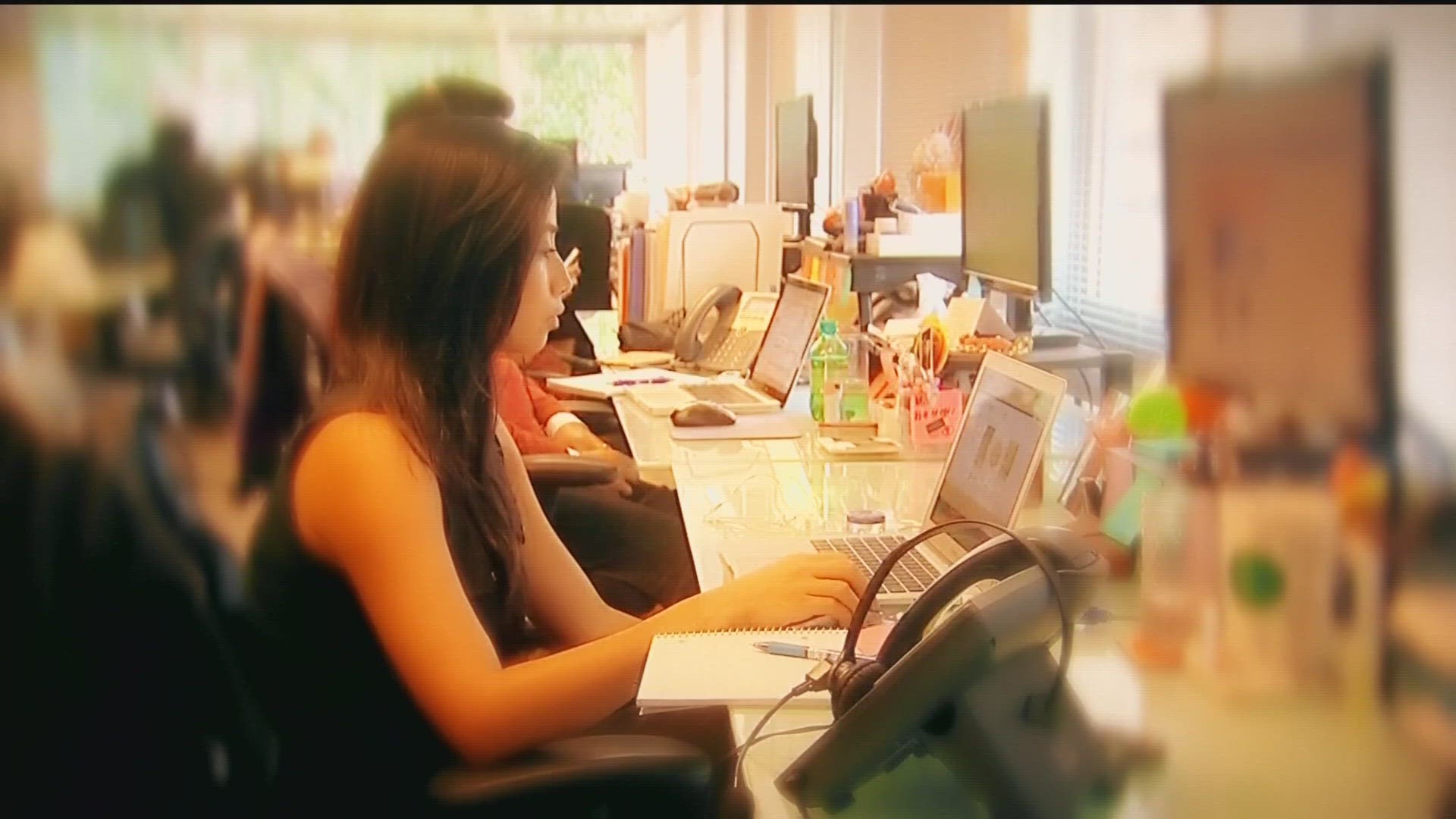ATLANTA — Georgia's workforce is struggling with burnout, a new survey shows.
Research gathered by goBeyondProfit published its synopsis Thursday, revealing that employed adults in the Peach State report "shocking levels of burnout" that are impacting job performance and mental wellness.
"It's pervasive across the whole state and across all generations," Tyler Jacobs with goBeyondProfit said. "We saw burnout from Gen Z all the way to Baby Boomers. So it's not an isolated incident."
Data shows that 70% of employed adults in Georgia feel some level of burnout in their job. More than half of executives, about 2 out of 3, also admit to experiencing some level of burnout.
Jacobs said burnout in the survey's case is rooted in a scientific definition but explained to survey takers as tied to work-related stress. Read the survey's methodology here.
"So people are feeling pressured, feeling torn between their work and home responsibilities and it's causing, impacting their performance at work," Jacobs said.
He described this as a visible decline in productivity from employees and a struggle with retention.
"Those suffering from burnout are more likely to leave their job in the next 12 months," Jacobs said, adding it's why executives should be concerned. "They're more likely to be disconnected, feeling lonely, feeling skeptical of company values and purpose statements."
As its the fifth year of the survey, Jacobs pointed out that such results didn't surface during the COVID-19 pandemic. He explained that people reported doing fine at work but struggling with mental health.
"Then this year, especially, it transitioned into this burnout that we were seeing," he said. "So the actual tail end, we think of a lot the mental health stressors over the past couple of years are finally catching up to people and weighing on them more."
Jacobs said employers can battle this burnout with a huge level of empathy and flexibility.
"And flexibility to them doesn't mean working from home, working from the office," Jacobs clarified. "It means the ability to manage life's challenges without having to take PTO without being so restricted."
Ultimately, Jacobs said, employees just want a little more ownership of their time and the ability to manage whatever life throws their way.
For more on how employers can battle burnout in the workplace, take a look at goBeyondProfit's suggestions.
How to know if you have burnout and how to address it
As employees may feel burnt out, 11Alive's medical expert Dr. Sujatha Reddy said people should consider certain signs.
One sure tell sign is the feeling of overwhelming exhaustion.
"Where you could just come back from vacation, you know, have just come back from a great meeting but you go to do your work or come back to the office and you have this feeling that you're just exhausted," Reddy said. "You cannot get motivated to start working."
If one is feeling a decrease in productivity, efficacy or work performance is another sign. This can accompany feeling tired and frustrated.
"You may not put your best foot forward and do your best work," Reddy said.
Reddy said people who are more likely to feel burnout are those with long work hours or a demanding workload.
"In most cases (of burnout) it's your home life suffering because of your work life - that is a risk factor," Reddy added. "The other risk factor that we hear people talk about is lack of control."
This could look like an employee who doesn't have a lot of decision-making power in their life, whether it's about how to get their job done or how to do it or in their life in general where people are making major decisions for them.
Healthcare professionals and truck drivers are some industries where burnout is prevalent.
How people cope with stress is also a sign of whether people are burnt out, Reddy pointed out.
"We know that work burnout can lead to sleep disturbances. It can lead to anxiety and panic. Often people that feel burnout or this exhaustion or frustration at work look to food or alcohol or something else to give them relief or escape," Reddy said. "But we also know that people that suffer burnout can have an increased risk of heart disease, increase risk of hypertension and increased risk of Type 2 diabetes."
Ultimately, burnout will impact one's physical health -- which is a detrimental symptom.
"All the stress affects your body physically," Reddy said.
If these feelings are symptoms are chronic: you most likely have burnout.
"You have a great weekend away, a vacation away - you come back and it's still the same feeling," Reddy said.
If one notes physical changes, lack of sleep, stomach or digestion changes, bowel habits - this could be a sure-tell sign of burnout, especially when accompanied by other symptoms.
Reddy said that if people feel like they have burnout to turn to their human resources department. Companies may have resources that people can consider, adding that oftentimes such benefits for underutilized.
Next, people should address any trouble they have sleeping.
"I know that is often sleep is disturbed when you feel that chronic fatigue and burnout but if you can help yourself with a regular scheduled and incorporating some sort of physical exercise into it can help with the stress of life," Reddy said.
Practicing mindfulness, meditation and yoga can also help people take a step back and look into themselves, which can help with disconnecting from stressors.
"Kind of disconnecting even for 10 minutes can really be restorative or really recharge your batteries," Reddy said.
Of course, if someone is experiencing extreme symptoms, it's best to consult with their doctor to see what lifestyle changes may be necessary.

